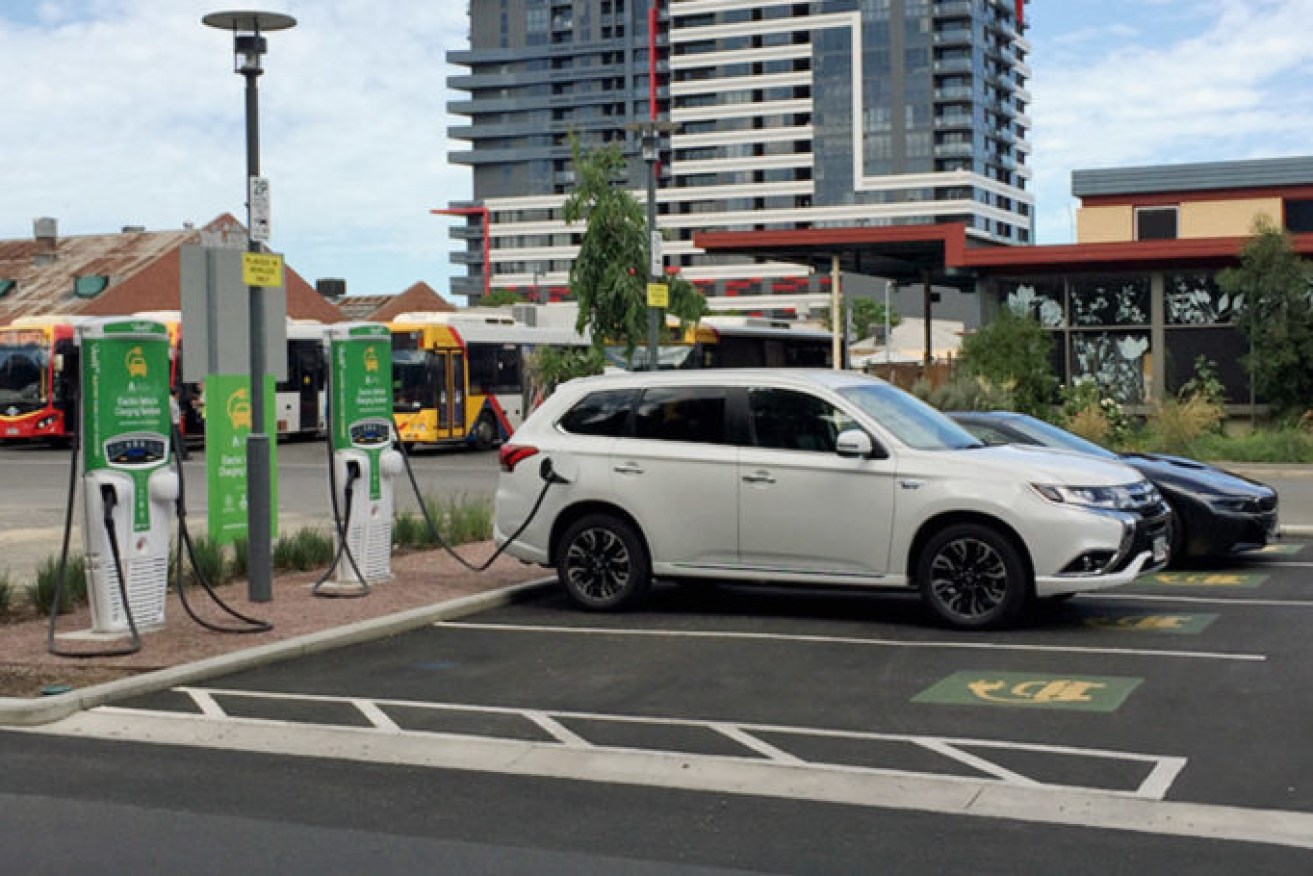Electric car rego to triple under Govt tax: Labor
A State Government plan to tax electric vehicle use could see EV drivers pay registration fees three times higher than four-cylinder car owners, according to Labor – but the Treasurer says owners will still save by not paying fuel excise.


Photo: Bension Siebert/InDaily
A 2-cent per kilometre road user charge for plug-in hybrid vehicles and a 2.5-cent charge for electric vehicles would be introduced by 2027 under legislation tabled by Treasuer Rob Lucas last week.
The levy, announced at the 2020-21 State Budget, was scheduled to come into force this year but has been delayed twice following backlash from the sector and opposition in Parliament.
Lucas, who has conceded the legislation is “unlikely” to pass, has defended the levy as “necessary” to ensure electric vehicle owners “contribute to the upkeep of our roads into the future”.
“Ultimately, as the State transitions towards a higher concentration of zero and low emission vehicles, there will be a corresponding reduction in the number of motorists paying fuel excise which contributes to vital road funding to help maintain and improve the state’s road network,” Lucas said in August.
But shadow treasury spokesperson Stephen Mullighan said he attended a Department of Treasury and Finance briefing on the levy last week and was told the tax would be considered as an additional registration charge, on top of the $138 yearly registration fee already levied on EV owners.
Mulligan said that based on the briefing, electric vehicle owners travelling an average yearly distance of 12,200km would pay a total of $443 in annual registration costs ($305 from the road user charge plus $138 for standard registration).
Mullighan said this was 3.2 times higher than the $138 that four-cylinder vehicle owners are required to pay.
“It’s clear these punitive registration costs will make motorists turn away from electric vehicles and slow the take-up rate of electric vehicles across the South Australian community,” he said.
“Electric vehicle owners already pay exactly the same drivers licence fees, registration costs, and any traffic fines as any other (four-cylinder) motorists.
“The government repeating its claims that they’re not contributing to the upkeep of the roads is simply wrong.”
Mullighan said the existing taxation regime for electric vehicle users “works fine” as it puts them on an equal footing with four-cylinder vehicle owners.
“But applying this additional levy on top of it, factoring it in as an additional registration charge, is farcical really,” he said.
But Lucas said Labor’s argument is “nonsense” as EV owners will end up paying less in taxes annually because they avoid paying fuel excise to the Commonwealth.
“The difference is with current vehicles you pay $565 average motor fuel excise through the year,” Lucas said.
“With electric vehicles, you don’t pay that through the year, at the end of the year you pay $305 road user charge, which is about $260 cheaper.”
Lucas said the absence of fuel excise costs will give electric vehicle owners a “cash flow advantage”.
“That’s how you encourage people to take up electric vehicles, cause it’s cheaper,” he said.
Mullighan also said he was told by Treasury the electric vehicle levy has been indexed with the consumer price index from 2020 onwards, rather than 2027, which he said meant that when the tax is introduced, the levy will be more than 2.7 cents per kilometre for electric vehicles and 2.4 cents per kilometre for plug-in hybrid vehicles.
Under that regime, an average travel year for an electric vehicle user would accumulate a road user charge of $340.
But Lucas said the CPI increases would ensure consistency across jurisdictions.
“All of the states that are introducing it have CPI’d from straightaway,” he said.
“New South Wales, who are the same as us and are going to introduce it in 2027, are going to CPI it from this year.
“The reason is in the end you need the greatest degree of consistency between the jurisdictions.
“So when you get there (2027), you’re all paying roughly the same amount for road user charge rather than having completely different levels.”
The claims came after car manufacturer Mitsubishi and Volkswagen expressed their opposition to the electric vehicle tax in an open letter to the State Government this morning.
The global car manufacturers, along with the Smart Energy Council, Solar Citizens, Conservation SA, Doctors for the Environment Australia and The Australia Institute, said South Australia was “lagging behind” the rest of the world on electric vehicles.
“If this tax goes ahead without adequate support for new car buyers, it will only make things worse,” the letter reads.
The State Government is also offering a $3000 subsidy for 6000 EV purchases as part of the legislation.
Just 6900 electric cars were sold in Australia last year, representing 0.7 per cent of new car sales.
Only 412 electric vehicles were sold in South Australia in 2019, according to the Electric Vehicle Council.
However, SA has the second-highest number of EV purchases per 10,000 car sales (61) in Australia, behind only the ACT (83).
Electric cars made up more than 10 per cent of car sales in the EU and the UK last year, while Norway is the high benchmark at just under 75 per cent.




